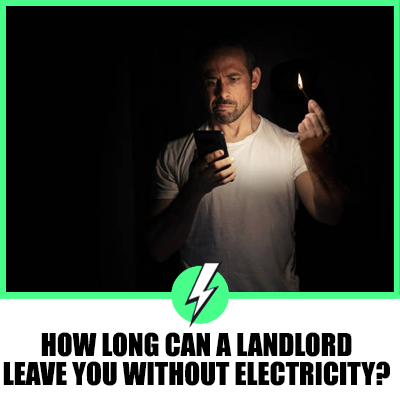How Long Can a Landlord Leave You Without Electricity in the UK and the US?
Living in a rental can be complex, both in the UK and the US.
The nitty-gritty of tenancy rights and landlord obligations can sometimes seem like a maze.
This maze gets even more complicated when it comes to utilities.
You know, the crucial ones like electricity, heating, and so on.
In this article, we’ll clear up some of this confusion.
We’ll explore what landlords are legally required to provide in the UK and the US.
We’ll also talk about how long they can reasonably leave you waiting for these utilities to be fixed.
Let’s dive right into the first burning question:

Contents
How Long Can a Landlord Leave You Without Electricity in the UK?
If you’re renting in the UK, you should know that landlords are required to provide access to utilities.
Yes, that includes electricity.
Now, should there be an interruption in this service, landlords have a duty to set it right as soon as possible.
But here’s the kicker – there isn’t a set “maximum” time frame for this.
That’s right; UK law doesn’t specify how long is too long to leave you without electricity.
However, the consensus from online discussions suggests that tenants can be left without electricity for days.
This, of course, can be a significant source of distress.
It’s also important to remember that the definition of “reasonable” time to fix these issues can vary.
Still, leaving tenants without electricity for a prolonged period (think days or weeks) could potentially be considered a violation of the landlord’s duty.
When Can You Withhold Rent in Georgia?
Now, let’s hop over the pond to the US.
Here, tenant-landlord laws can vary quite a bit from state to state.
For instance, in Georgia, you may have the right to withhold rent if your landlord fails to make necessary repairs within a “reasonable time.”
But hold on, there’s a catch – the conditions for this are quite strict.
To exercise this right, you must provide written notice to the landlord, specifying the repairs needed, and then wait a “reasonable time.”
If the landlord still hasn’t acted, then you can withhold rent until the repair is completed.
How Long Does a Landlord Have to Fix Heat in Wisconsin?
Let’s talk about heating now, starting with Wisconsin.
Landlords in Wisconsin must maintain reasonable heat during the colder months as part of the rental agreement.
The state, however, doesn’t provide a specific timeline for fixing heating issues.
What’s expected is a “reasonable” response time.
Insights from online discussions suggest that if your heat goes out during winter, “reasonable” could be within a few hours.
Failure to meet this expectation might give you grounds for legal action.
How Long Does a Landlord Have to Fix Heat in Indiana?
Next stop, Indiana.
In this state, the landlord’s responsibility to provide a habitable property includes working heat.
Now, the time frame for fixing this is not set in stone.
It can depend on several circumstances, but a “reasonable” time is generally considered within 24 hours during colder months.
Do Landlords Have to Provide Heat in NC?
Over in North Carolina, the rules stipulate that landlords must provide a heating system in good working order.
There’s no specified time frame for fixing heating issues, but the overall rule is that landlords must keep properties fit for habitation.
Insights from Online Discussions
There’s a lot to learn from online discussions on platforms like Reddit and Quora.
Real-life stories of tenant-landlord disputes offer invaluable insights into this topic.
For instance, on a Reddit thread, a UK tenant reported their landlord shutting off electricity for two days.
This sparked a lively discussion on the possible legal remedies.
Over on the Landlordzone forum, tenants were seen demanding compensation for a lack of electricity.
The consensus?
Most forum participants agreed that compensation was indeed due if the landlord was at fault.
These real-life cases underline the importance of understanding your rights and obligations as a tenant.
It also stresses the necessity for open and honest communication between landlords and tenants to resolve issues promptly and fairly.
Conclusion
Whether you’re in the UK or the US, your landlord has a duty to ensure that your property is habitable.
This includes providing utilities such as electricity and heat.
While no specific time frame is usually given, a “reasonable” amount of time is often implied.
Remember, laws can vary by region in the US.
So, always consult local tenant-landlord laws and consider seeking legal advice if you’re left without crucial utilities for an extended period.





